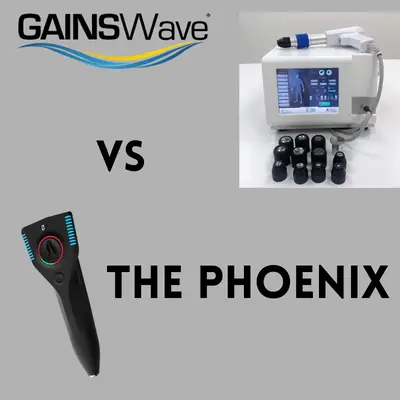TENS has been a staple treatment in pain relief for many conditions. One of those conditions is arthritis. But should you try it?
TENS units may be good for arthritis. While research is still mixed on the effectiveness of TENS and arthritis, some studies do suggest that TENS could prove beneficial in relieving pain in arthritis patients. It won’t hurt, and it’s not an expensive treatment to try. So, you should see if it works for you.
TENS can be useful for arthritis. But if you want to know more about it and what studies really have to say about all of this, you should read on and find out more.
Need to look for a TENS unit for arthritis? Click here for the Best TENS unit for Arthritis
What Is TENS and How Do You Use It?
TENS is a small therapeutic device that helps people in pain. It’s inexpensive and easy to get, use, and understand. Recently, TENS has been going through a difficult time since ACR (American College of Rheumatology) has stated that the lack of evidence suggests we shouldn’t use it.
In reality, people report all sorts of results from TENS. From extremely satisfied patients whose pain has decreased to those who were annoyed by the device, it’s evident that TENS does need more research. Scientists need to map out which conditions TENS can be helpful with.
But let’s start with the basics — how does it work?
TENS is a device that emits low-frequency electrical signals through the skin and thus blocks out the pain signals. At the same time, it also stimulates endorphin production in the body, especially in the affected areas. Endorphins, as you may know, are the body’s natural painkiller.
TENS also activates other chemicals and hormones in the body that work to reduce pain in the body. It’s mostly used for sports or work injuries — by controlling the level of pain in the body, it allows the person using it to be more active.
You can expect TENS to be fairly easy to use.
There are usually two or four electrodes, depending on the device. You have to clean the area where you want to place them with a bit of rubbing alcohol, and then put some conductor gel on the spot. After that, place the electrodes on either side of the pain. You can look up the best placements according to acupuncture and medical recommendations.
Use medical tape or adhesive pads to secure them — so they stay in place — and connect them with the device. Then, you should adjust the settings so that they work for you. After that, all you have to do is turn the device on.
It’s best to keep the electrodes on the same spot for 15 to 20 minutes before moving them to a different area, or just moving them for an inch or two in a different direction. They should always stay at least an inch (2.5 cm) apart, and you should make sure that the area is clean before using them.
Dust, sweat, and different particles can react with the skin under the adhesion of the pads and create irritation. If you use them for more than 20 minutes, you could also start to feel pain or a different form of discomfort.
You can use it as much as you want, but you shouldn’t overdo it since some research shows that you can grow tolerant to its effects. Since it’s so portable, you can take it everywhere with you and use it on the go, although you should avoid using it while driving, sleeping, or near water.
TENS units are battery-operated, and you will have to charge them every once in a while. Before you start to use a TENS unit, you should consult your doctor on the setting that would work for you. But ultimately, you should focus on how you feel while using it. If you feel any discomfort, that means that the setting is too high for you and that you should bring it down to what feels best.
A good rule of thumb is to go for the highest frequency you can tolerate without being in pain. TENS should feel strong but only tingly, without pain. Want know more about TENS settings? Click here.
The pain relief is usually immediate and doesn’t last for a long time after, at least not in its full intensity. In some cases, it can last for longer, but this will depend on the case. For the majority of people, though, the effects are likely to last only for as long as the TENS is on. Overusing it to extend its effects could be painful, or it could lead to a higher tolerance.
You should experiment, but within the guidelines so that you don’t misuse it.
TENS can treat many different conditions, both acute and chronic. However, research states that you shouldn’t solely rely on it because the results can vary from person to person. You could use TENS and feel a good amount of relief or feel no relief at all, so combine it with other forms of therapy.
For example, massage works well with TENS, and so do moist heat packs. You can also do some exercise when the TENS unit increases your range of motion — this can help too.
Want to know where a TENS unit can be placed? Check out my TENS placement guide here. Below are a few common TENS electrode pad placements:
What Studies Have to Say
Studies have concluded mixed results from TENS therapy. Some studies on TENS haven’t been done properly, which disqualifies them from being included in official reviews. For example, in the case of arthritis, a systematic review that rounded up several studies that were flawed found that there’s no meaningful difference between using TENS and not using TENS.
However, a group of studies that tested the treatment properly found that the effects were, in fact, significant enough to warrant further TENS use.
But in general, studies are largely poorly structured, with bad control, and many other issues. Statistically, though, the studies don’t show a clear decision either for or against TENS.
Even though TENS still has a ways to go until a proper medical conclusion is made, it doesn’t hurt to test it out. If it relieves pain, then that’s good for you. Still, you have to make sure that you are using it properly.
Poor usage of TENS could cause a shock, and you have to check with your doctor whether you can use it or not when considering your medical condition (certain health issues don’t work well with TENS and could be made worse). In general, you should be okay, since there’s not a lot of reports of harm from TENS.
Will TENS Work for Arthritis?
Before diving deeper into the subject of TENS and arthritis, you should know that TENS cannot change your condition for the better. The only thing it actually can do is help with the pain. It’s more effective for some forms of arthritis than others, but it will depend on individual cases.
TENS can be used for:
- Osteoarthritis
- Rheumatoid arthritis
- Ankylosing spondylitis
- Fibromyalgia (pan disorder)
It could be a beneficial solution for arthritis pain because it’s safe and generally easy to use. However, you should communicate with your doctor about this. But if they approve the usage of TENS for your pain, you can get it as an OTC treatment.
You may be wondering about the possibility of a placebo effect and for the right reason. In reality, any medication could have some sort of a placebo effect, because you believe it will work. However, a study has shown, when compared with a TENS placebo, that the effects of the real TENS were bigger.
Treatments Usually Recommended for Arthritis
Arthritis is common, and it’s a very painful health issue that can prevent people from living well. Unfortunately, the medical world hasn’t exactly come up with a definite cure for this, and you have probably heard of many different solutions.
Here are some of them:
- Using cold or hot therapy. This form of therapy has been used for a very long time in society, and it has proven helpful, depending on the case. All you have to do is get a cold pack or a moist heat pack and place it in the area of your pain. You should do this for 15 minutes and then switch to a different painful spot or take a half an hour break before putting a pack back on your painful spot.
With chronic pain, patients often need different forms of therapy on different days, depending on what feels best, so you should test this out and see what works.
- Relax. It may be easy to say and difficult to do when you have pain, but you can try it as one method of pain relief that may work. For this, you have to tense up a muscle and then release it. You can do this with all of the muscles while lying down. This process reminds of meditation, and it can help relieve the mental stress induced by pain.
- Ointments with capsaicin. Capsaicin is a compound that can relieve your pain, and creams with it can help make it easier. Since it’s found in hot peppers and other hot food, you may feel a bit more pain first, but it will go away soon, and you will feel better.
- Use painkillers. People in pain want to feel immediate relief, especially if the degree of pain is unbearable. While painkillers can be addictive, you should have some on hand to handle those flare-ups quickly, so you don’t have to suffer. Try to go for drugs that are not addictive — something like ibuprofen might do the job. However, you should always discuss this with your doctor before using anything.
Benefits of TENS for Arthritis
TENS has tons of benefits for people in pain, especially with chronic patients. So, you can try using it instead of these other options or in combination with them. Here are some TENS benefits you may see if you start using it:
- No addiction. While painkillers can be addictive, there is no danger of that with TENS. You can use it as much as you want without getting addicted. Your body will not look for it when it’s not there, and you’ll be able to have a normal life.
- TENS activates endorphins. One of the main purposes of TENS is to block pain signals, but it can also activate the body’s natural painkillers called endorphins, which makes it easier for you to get pain relief.
- Inflammation reduction. One study has found that TENS can actually reduce inflammation, which is especially useful with arthritis patients. While there needs to be more research on this subject, it doesn’t hurt to try.
- You have the control. A big disadvantage of many treatments is that you get no control, and often little information, on what is being done to help you. With TENS, you get all the control over your treatment, and you get to say when you take the treatment.
How Does TENS Affect Arthritis Symptoms?
The main goal TENS has is to block the pain signals and stimulate the production of endorphins in the body. You’ll get pain relief that you need, and your mind might feel better, too, without the pressure of constant pain.
You won’t need to use any medication, and TENS is not addictive. Numerous patients have found TENS generally effective, especially while you use them.
But, to understand how TENS works, you have to understand arthritis and how it works first.
The most common type of arthritis is osteoarthritis, which is a result of wear and damage to the bones during regular life. For example, people who work at jobs that involve repetitive movement often suffer from osteoarthritis. Another type of arthritis is rheumatoid arthritis, which is an inflammatory type, and it’s a result of the immune system issues.
The usage of TENS for arthritis will be different, based on where your pain is located. The important part is to put the electrodes near the painful spot. For example, if you have joint pain, you can put the electrodes on the softer tissue around the pain.
But you also may have issues with electrodes if your arthritic pain is located on tough-to-reach areas. In that case, you’ll benefit from a different form of therapy instead. You should also keep in mind that TENS won’t always help everyone, but it also might.
Luckily, TENS is a cheap and safe method for treating pain, so you can try it without any side-effects. You should also talk to your doctor and see if your other health conditions allow you to use TENS. Another solution, if you want to make sure that TENS will work for you is to borrow one from a friend or rent one out and see if it works.
How to Use TENS for Arthritis?
There are several tips on using TENS for arthritis. Here are some of them:
- If your pain is in a certain area, you should place the adhesive pads above and below that area (around the boundaries of pain) or on each side of the pain. This will be the optimal placement to help you feel relief. The same applies to joints.
- If you have pain in several areas, a good rule of thumb is to put the adhesive pads on the most painful spots first and then move them to other areas. You might get some relief in other areas as well, and the most painful area treatment means the most relief.
- If you have pain in the hip or in the knee, the best placement for the TENS adhesive pads is on your lower back, where the nerve supply is located, so you’ll get pain relief while still having the mobility of your hips and knees.
- If you want to stay active, you should boost your range of motion by working out right after the treatment. However, you should consult with your doctor on this before doing it, to establish whether the movements will affect your state in a negative way.
- If your pain is constant, you should keep the electrodes on the painful areas for 30 minutes at the most before moving them to another spot. Repeat this three times a day.
- Get a TENS unit with different options, so that you can adjust it according to your needs. While higher frequencies have proven more effective, lower ones can enable longer use and activate endorphins.
Looking for the Best TENS Unit to treat arthritis? Check out my recommendations here.
Conclusion
TENS does need more research and validation in the medical circles, but it certainly has support from people using it. It might help you with your arthritis, so you can try it. Make sure that you consult your doctor before getting it.
You can also try to combine TENS with other forms of therapy, especially massage, as it can help relieve your pain for longer. All of this could provide the results you’re looking for and allow you to live your best life.
Sources
- NCBI: An investigation of the development of analgesic tolerance to TENS in humans.
- NCBI: Effect of transcutaneous electrical nerve stimulation on human blood beta-endorphin levels.
- NCBI: Transcutaneous Electrical Nerve Stimulation Reduces Movement-Evoked Pain and Fatigue: A Randomized, Controlled Trial.
- NCBI: Use of Transcutaneous Electrical Nerve Stimulation Device in Early Osteoarthritis of the Knee
- NCBI: Effects of Transcutaneous Electrical Nerve Stimulation on Pain, Pain Sensitivity, and Function in People With Knee Osteoarthritis: A Randomized Controlled Trial
- NCBI: Transcutaneous electrical nerve stimulation in experimental acute arthritis.
- NCBI: Pain relief in osteoarthritis and rheumatoid arthritis: TENS.
- NCBI: Transcutaneous electrical nerve stimulation (TENS) for the treatment of rheumatoid arthritis in the hand.
- NCBI: An Investigation of the Development of Analgesic Tolerance to Transcutaneous Electrical Nerve Stimulation (TENS) in Humans
- NCBI: Transcutaneous Electrical Nerve Stimulation: Mechanisms, Clinical Application, and Evidence
- NCBI: Effectiveness of Transcutaneous Electrical Nerve Stimulation for Treatment of Hyperalgesia and Pain
- NCBI: Is TENS purely a placebo effect? A controlled study on chronic low back pain.
- University of Iowa: Transcutaneous electrical nerve stimulator (TENS)
- Harvard University: Arthritis






2 responses to “Are TENS Units Good for Arthritis?”
[…] units are most commonly used by patients with chronic pain like arthritis. However, people with injuries caused by work or exercise, period pains, back, neck, or knee pain […]
[…] Arthritis Studies one study found that a 30-minute application of a Tens unit resulted in a decrease in pain, among patients while walking. […]